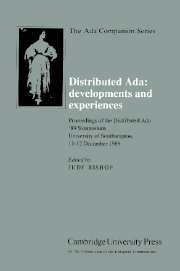 Distributed Ada: Developments and Experiences
Distributed Ada: Developments and Experiences Published online by Cambridge University Press: 13 October 2009
Abstract
This paper describes the design and implementation of a Distributed Ada system. The language is not well defined with respect to distribution, and any implemtation for distributed execution must make a number of decisions regarding the language. The objectives in the implementation described here are to remain as close to the current definition of Ada as possible, and to learn through experience what changes are necessary in future versions. The approach we take translates a single Distributed Ada program into a number of Ada programs (one per site), each of which may then be compiled by an existing Ada compiler. Issues discussed include the ramifications of sharing of data types, objects, subprograms, tasks and task types. The implementation techniques used in the translator are described. We also develop a model of the performance of our system and validate it through performance benchmarks.
INTRODUCTION
The importance of distributed systems cannot be over-emphasized, especially with the reduction in the cost of high speed connection between powerful processing elements. Distributed computing has made inroads into many important areas such as manufacturing, avionic systems and space systems. The cost of developing software for such systems, however, is reaching astronomical proportions [1]. A major concern is the creation of software tools to economically harness the increased computing power.
Central to distributed software development is the language used to program these distributed devices.
To save this book to your Kindle, first ensure [email protected] is added to your Approved Personal Document E-mail List under your Personal Document Settings on the Manage Your Content and Devices page of your Amazon account. Then enter the ‘name’ part of your Kindle email address below. Find out more about saving to your Kindle.
Note you can select to save to either the @free.kindle.com or @kindle.com variations. ‘@free.kindle.com’ emails are free but can only be saved to your device when it is connected to wi-fi. ‘@kindle.com’ emails can be delivered even when you are not connected to wi-fi, but note that service fees apply.
Find out more about the Kindle Personal Document Service.
To save content items to your account, please confirm that you agree to abide by our usage policies. If this is the first time you use this feature, you will be asked to authorise Cambridge Core to connect with your account. Find out more about saving content to Dropbox.
To save content items to your account, please confirm that you agree to abide by our usage policies. If this is the first time you use this feature, you will be asked to authorise Cambridge Core to connect with your account. Find out more about saving content to Google Drive.